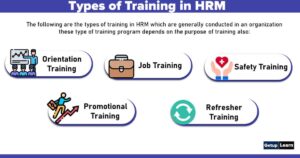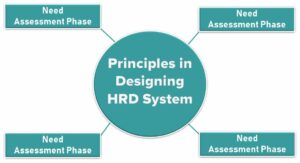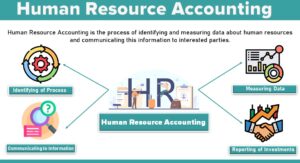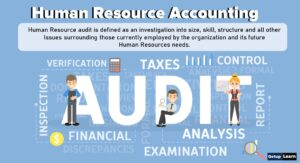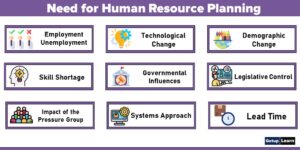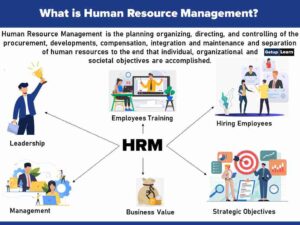Table of Contents
- 1 What is Performance Appraisal?
-
2 Significance of Performance Appraisal
- 2.1 Performance Improvement
- 2.2 Compensation Adjustments
- 2.3 Placement Decisions
- 2.4 Training and Development Needs
- 2.5 Career Planning and Development
- 2.6 Staffing Process Deficiencies
- 2.7 Informational Inaccuracies
- 2.8 Job-Design Errors
- 2.9 Equal Employment Opportunity
- 2.10 External Challenges
- 2.11 Feedback to Human Resources
- 3 FAQs Section
What is Performance Appraisal?
The performance appraisal is the process of evaluating the performance and competencies of an employee in terms of the requirements of the job for which he is employed, for the purpose of administration including placement, selection for promotions, providing financial rewards, and other actions which require differential treatment among the members of a group as distinguished from action affecting all members equally.
Significance of Performance Appraisal
Let’s look at the significance of performance appraisal:
- Performance Improvement
- Compensation Adjustments
- Placement Decisions
- Training and Development Needs
- Career Planning and Development
- Staffing Process Deficiencies
- Informational Inaccuracies
- Job-Design Errors
- Equal Employment Opportunity
- External Challenges
- Feedback to Human Resources
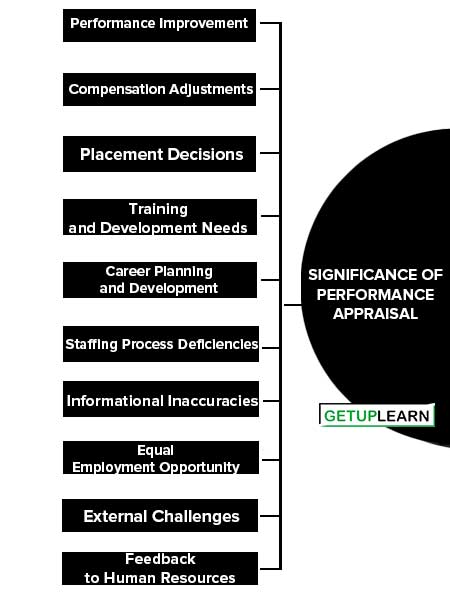
Performance Improvement
Performance feedback allows the employee, the manager, and personnel specialists to intervene with appropriate actions to improve performance.
Compensation Adjustments
Performance evaluations help the decision-makers to determine who should receive pay raises. Many firms grant part or all of their pay increases and bonuses on the basis of merit, which is determined mostly through performance appraisal.
Placement Decisions
Promotions, transfers, and demotions are usually based on past or anticipated performance. Often promotions are a reward for past performance.
Training and Development Needs
Poor performance may indicate a need for retraining. Likewise, good performance may indicate the untapped potential that should be developed.
Career Planning and Development
Performance feedback guides career decisions about specific career paths one should investigate.
Staffing Process Deficiencies
Good or bad performance implies strengths or weaknesses in the personnel department’s staffing procedures.
Informational Inaccuracies
Poor performance may indicate errors in job analysis information, human resource plans, or other parts of the personnel management information system. Reliance on inaccurate information may lead to inappropriate hiring, training, or counseling decisions.
Job-Design Errors
Poor performance may be a symptom of ill-conceived job designs. Appraisal help diagnose these errors.
Equal Employment Opportunity
Accurate performance appraisals that actually measure job-related performance ensure that internal placement decisions are not discriminatory.
External Challenges
Sometimes performance is influenced by factors outside the work environment, such as family, financial, health, or other personal matters. If these factors are uncovered through appraisals, the human resource department may be able to provide assistance.
Feedback to Human Resources
Good or bad performance throughout the organization indicates how well the human resource is performing.
FAQs Section
What is the significance of performance appraisal?
The significance of performance appraisal is:
1. Performance Improvement
2. Compensation Adjustments
3. Placement Decisions
4. Training and Development Needs
5. Career Planning and Development
6. Staffing Process Deficiencies
7. Informational Inaccuracies
8. Job-Design Errors
9. Equal Employment Opportunity
10. External Challenges.





